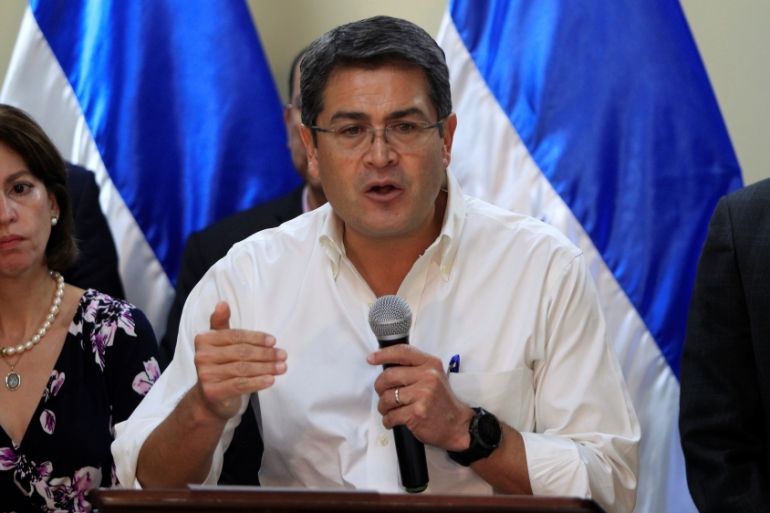Hernandez declared winner in Honduras disputed election
Opposition Alliance’s Nasralla rejects the results, calling them ‘fraudulent’ as country’s political crisis deepens.

Tegucigalpa – Honduras’ beleaguered elections commission officially declared incumbent Juan Orlando Hernandez as president-elect on Sunday amid ongoing opposition cries of fraud three weeks after election day.
Hernandez, Honduras’ first president to seek a second term in office, won by 50,446 votes, according to the Supreme Electoral Tribunal (TSE).
Keep reading
list of 4 itemsTrump held in contempt of court in New York trial for gag order violations
Solomon Islands PM Sogavare says won’t put himself forward for new term
Togo’s parliamentary election: Why all eyes are on President Gnassingbe
The TSE reported that Hernandez received 42.95 percent of the vote, while Opposition Alliance candidate Salvador Nasralla received 41.42 percent.
“We have fulfilled our obligation,” TSE chief David Matamoros said in a brief national radio and television broadcast. “We hope there will be peace in our country.”
Hernandez and the National Party have not responded to the announcement.
The TSE released the results during the wake for Hernandez’s sister and top official in his government, Hilda Hernandez, who died on Saturday, along with five other government and military officials in an Air Force helicopter accident.
Nasralla’s Opposition Alliance refused to recognise the results of the election.
“Our reaction is rejection and to call on the people to mobilise to make very clear that we will not accept the imposition of what the tribunal has said,” Opposition Alliance spokesperson Rodolfo Pastor told Al Jazeera.
“If they seek to impose Juan Orlando Hernandez through this unilateral declaration, obviously a period of crisis and popular mobilisation will follow,” he continued, adding that the Alliance maintains the TSE “does not comply with basic conditions of credibility”.
New elections?
Luis Almagro, secretary-general of the Organizations of American States (OAS), called on Sunday for new elections given the lack of certainty of the results and “the impossibility of determining a winner”.
Hernandez pulled ahead after an hours-long technical problem caused the TSE system to “go down”, overcoming what had appeared to be an insurmountable five percent lead for Nasralla with over half of ballots counted.
Repeated silences from the TSE and the sharp reversal of results fuelled suspicions of fraud.
The announcement is expected to deepen the Central American country’s political crisis that has already claimed the lives of at least 22 people in post-election turmoil, according to the human rights organisation COFADEH.
![At least 22 people have been killed during the political unrest since November's election [Moises Ayala/Reuters]](/wp-content/uploads/2017/12/b84add6a9a824b6ea30b85f761972238_18.jpeg)
Political analyst Jorge Yllescas told Al Jazeera that the clearest solution to the crisis would be a new “totally transparent” election. He speculated that in that scenario it would be difficult for Hernandez to win given the high levels of rejection of his government.
“There are many irregularities,” Yllescas said.
“The re-election of Juan Orlando is illegitimate, the tribunal is illegitimate, the whole system it has is very weak,” he added.
“That’s why I believe in doing an [electoral] process in six months, changing the (TSE) magistrates, so that it has more credibility.”
He added that if Hernandez stays in power, the fact that he was elected for a second term despite a constitutional ban on re-election would create “a lot of instability for the country” in the next four years. A controversial Supreme Court ruling overturned the ban on re-election in 2015.
‘Serious doubts’
The announcement of the results came hours after Nasralla travelled to Washington, DC, to hold meetings with the OAS and the US Department of State to present evidence of alleged electoral fraud and pressure for an international response to the contested election.
Nasralla responded to Hernandez’s win repeating his claim that there was fraud “before, during and after” the election.
He added in a telephone interview with local media that he was “optimistic” and suggested he would discuss with the OAS the possible suspension of Honduras from the regional body over a break in the democratic order. The OAS suspended Honduras in 2009 over the military coup.
![Nasralla has dismissed the results as 'fraudulent' [Jorge Cabrera/Reuters]](/wp-content/uploads/2017/12/9c78f82d67bf4a359b02039f5cfecf8d_18.jpeg)
Before the TSE announcement, OAS chief Almagro stated that the OAS election observation mission continued to have “serious doubts” about the election results and urged for no “irresponsible” announcements to be made.
Head of the OAS observation mission, Jorge Tuto Quiroga, said in a press conference on Sunday night that due to the “low-quality” process, the mission “cannot confirm that the questions surrounding [the electoral process] have been cleared up.”
Opposition supporters took to the streets in dozens of neighbourhoods in the capital, Tegucigalpa, as well as in San Pedro Sula, and other parts of the country in the hours after the announcement to protest Hernandez’s win.
The opposition had already called for a national strike Monday to protest the results after similar protests and blockades rocked the country Friday.
The Opposition Alliance, as well as Liberal Party candidate Luis Zelaya, who placed third, had filed challenges to the results. The TSE rejected their petitions.
The Opposition Alliance had demanded a complete vote-by-vote recount of the country’s more than 18,000 ballot boxes by an independent, impartial commission. The Liberal Party’s Zelaya and some sectors of civil society had called for a fresh election.
The European Union mission representative Jose Antonio de Gabriel reported on Sunday that the mission did not observe discrepancies in a random sample comparing 300 Opposition Alliance copies of vote tallies to the TSE tallies. He stated the EU team will continue to monitor any challenges that may be filed against the results.
In an OAS-commissioned report released on Sunday, Georgetown University professor Irfan Nooruddin concluded: “On the basis of this analysis, I would reject the proposition that the National Party won the election legitimately.”
Honduran election law establishes a period of 10 days to file appeals against the results.